
|
![]()
Greatest Films of the 1930s
1930 | 1931 | 1932 | 1933 | 1934 | 1935 | 1936 | 1937 | 1938 | 1939
Title Screen Film Genre(s), Title, Year, (Country), Length, Director, Description 

L'Atalante (1934, Fr.), 89 minutes, D: Jean Vigo
The last film (his second feature) from director Vigo before his untimely death at age 29, a few months after the film's premiere. See the 89 minute restored version, rather than the studio-cut, butchered version, renamed The Passing Barge. This poetically-told, visually-rich, sometimes playful drama told the down-to-earth and simple story of French provincial girl Juliette (Dita Parlo) who married young river barge captain Jean (Jean Dasté), and then lived aboard his dingy vessel, named the Atalante. Two others, besides the crew, included grizzly, burly sea dog-sailor Père Jules (Michel Simon) with many strange mementos, a cabin boy, and Jules' six stray cats. Their new marriage as honeymooners disrupted the routines and the harmony of everyone on-board the cramped and dirty vessel. When the barge arrived in Paris, a bored Juliette left to see the nightlife and to escape from her husband's harsh ways. When she returned to the port, her broken-hearted and depressed husband had left without her. Pere Jules went to find Juliette - and they were reunited together. Noted for a beautiful underwater sequence and an exquisite love scene of the super-imposed husband and wife on separate beds.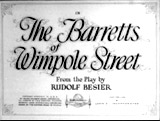


The Barretts of Wimpole Street (1934), 110 minutes, D: Sidney Franklin
A prestige piece of work adapted from a stage play, beautifully produced by MGM. An historical, emotional, heart-felt tale of Victorian literary poets Robert Browning (Fredric March) and Elizabeth Barrett (Norma Shearer) who fell in love with each other in 19th century England. Her jealous and over-protective father Edward (Charles Laughton) vigilantly watched over the couple. With her newly-found vitality and happiness, the invalid, bed-ridden poet broke away from her domineering father's dictatorial stranglehold.


The Black Cat (1934), 65 minutes, D: Edgar G. Ulmer
A classic, enigmatically disturbing horror film from Universal Studios in the 1930s. With spooky, moody cinematography and bizarre Expressionistic sets. It became Universal's top-grossing film of the year. The visually intriguing, austere, landmark horror film masterpiece - a tale of European post-war anguish and death, was expressionistically directed by Edgar G. Ulmer. Its theme of the horrors of war would be echoed in his later films. Considered by some to be the first American psychological horror film, with dark sexual repression, twisted relationships, and aberrant behavior (Satanism (devil worship), black mass orgies, necrophilia, pedophilia, sadistic revenge, murder and incest). Its fantastic architectural settings, expressionistic lighting, interesting geometric patterns and designs, and bizarre sets all added a richness to the strange tale. The film teamed two masters of the horror genre together: Dr. Vitus Verdegast (Bela Lugosi) who sought revenge against devil-cult worshipping Hjalmar Poelzig (Boris Karloff).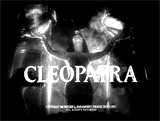


Cleopatra (1934), 102 minutes, D: Cecil B. DeMille
DeMille's extravagant production of the spectacular historical epic of the Egyptian Queen of the Nile. It was a modernistic 1930s costume spectacle that reshaped the Cleopatra story. The Paramount Studios film was campy, grandiose, unreal and ludicrous historically - filled with DeMille's usual mixture of sin and sex. Sexually-suggestive costumes adorned most of the female characters. Seductive, mysterious, and voluptuous Cleopatra (Claudette Colbert) flirted openly with Roman lovers. After the death of Julius Caesar (Warren William), she focused her attention on Marc Antony (Henry Wilcoxon). This kitsch film was well-known for three scenes: the infamous barge scene, an elaborately-staged sea battle (seen in montage), and Cleopatra's suicidal death scene from the bite of an asp.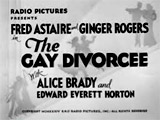


The Gay Divorcee (1934), 107 minutes, D: Mark Sandrich
Notable for the first teaming of Astaire and Rogers in a starring role. In a Brighton seaside hotel, dancer Guy Holden (Fred Astaire) was mistaken by Mimi Glossop (Ginger Rogers) as the writer/correspondent Rodolfo Tonetti (Erik Rhodes) who was part of her lawyer's fictitious set-up to prove infidelity in her divorce suit. Holden became interested in and infatuated by her, but moped around love-sick after being rejected in this amusing case of mistaken identity. He pursued her nevertheless, romanced and finally won her when she agreed to marry him. Included great music and dancing with Cole Porter's "Night and Day," Oscar-winning "The Continental" (the first time an Academy Award was given for Best Song), and "A Needle in a Haystack."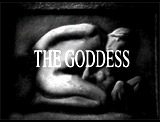


The Goddess (1934, China) (aka Shen nu), 73 minutes, D: Yonggang Wu
This melodramatic, heart-wrenching silent film about shame and social injustice told of a self-sacrificing mother-son relationship, between the un-named major character known as 'The Goddess' (Lingyu Ruan, an actress who committed suicide the following year at age 24), a street-walker in Shanghai, and her infant son (Keng Li as grown-up). [Note: Ruan's life was showcased in Stanley Kwan's biopic The Actress (1992) starring Maggie Cheung.] Her pimp was brutish, low-life gambler nicknamed 'the Boss' (Zhizhi Zhang). She fled from him, although he pursued her and forced her back to a life of prostitution. She used her hidden cash earnings to save for his schooling tuition, and provide him with a better life when he grew up. Her reputation as a hooker caused others to ostracize and shun her and her son, resulting in his expulsion by the school board, although she was championed by a kindly and sympathetic school principal. In the film's conclusion, once 'the Boss' located and misspent all of her cash, the anguished 'Goddess' killed him in self-defense (a broken bottle striking his head), but was sentenced to twelve years in prison. The principal personally adopted the son to give him a proper upbringing.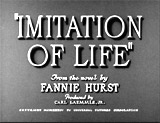

Imitation of Life (1934), 106 minutes, D: John M. Stahl
The first film adaptation of Fannie Hurst's melodramatic novel - about two hard-working women and their daughters. A sentimental soap opera about an ambitious widow/working girl Beatrice Pullman (Claudette Colbert), her daughter Jessie (Rochelle Hudson at age 18), her black housekeeper/maid Delilah Johnson (Louise Beavers), and her maid's daughter Peola (Fredi Washington at age 19) whose light complexion enables her to pass for white. Beatrice went into a successful pancake restaurant business with Delilah. The film dealt with disappointments in personal relationships and questions of identity and racial confusion.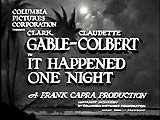



It Happened One Night (1934), 105 minutes, D: Frank Capra
A major Academy Award winning blockbuster film, a delightful, sparkling romantic comedy. A spoiled young heiress Ellie Andrews (Claudette Colbert) ran away from her disapproving millionaire father Alexander (Walter Connolly). She disguised herself for her travels to her boyfriend King Westley (Jameson Thomas), taking a cross-country bus trip from Florida to New York. On the bus, she ran into a recently-fired, out-of-work, no-nonsense newspaper reporter Peter Warne (Clark Gable), who agreed to help her when she lost all her money. He played along in order to get the exclusive story so he could get his job back. By film's end, they fell in love, almost against their wills. The film included a number of memorable scenes together, including the "Walls of Jericho" sequence and their competitive hitch-hiking scene.


It's A Gift (1934), 68 minutes, D: Norman McLeod
A classic comedy from W. C. Fields, one of his best. A small-town grocery clerk, long-suffering Harold Bissonette (W. C. Fields) was beset by harrassments from his children, his nagging wife Amelia (Kathleen Howard), and customers. He packed his family and belongings into their car for a trip out West to California to his "orange grove." Included classic slapstick scenes and routines, including the ruination of his store by a blind detective, and the back porch swing scene when he attempted to take a nap.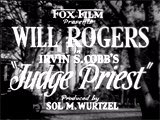


Judge Priest (1934), 80 minutes, D: John Ford
Popular humorist Will Rogers starred as long-time, small-town, justice-dispensing Judge William Priest, based upon the stories of Irvin S. Cobb. This sentimental story (criticized for some racist stereotypical characters) was later remade by director John Ford as The Sun Shines Bright (1953). The widowed judge, a Confederate veteran, used common-sense, plain-speaking and lack of pretense in his small-town legal dealings - in the post-bellum South (1890s Kentucky). Meanwhile, he also was a matchmaker for his nephew Jerome or "Rome" (Tom Brown), newly-educated as a lawyer, to romance next-door neighbor schoolteacher Ellie May Gillespie (Anita Louise), an unwed mother. Priest's high-society sister-in-law Caroline (Brenda Fowler) objected to the matchup, because she had an unknown lowly heritage (her poor mother died in childbirth and her father was unknown). Later, it was discovered that the town's blacksmith Bob Gillis (David Landau) was Ellie's missing father who had changed his name. Although charged for assault during a one-sided trial, Gillis was actually found to be defending his daughter's honor, and he was a Civil War Confederate hero who had secretly supported his daughter for years.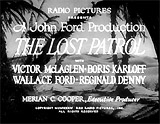


The Lost Patrol (1934), 74 minutes, D: John Ford
With an Oscar-winning score for oft-nominated Max Steiner. It provided the template for many future films about men during wartime surrounded by the enemy and awaiting death. During World War I in the year 1917, a small band of British cavalrymen were lost, cut off, and under siege in the hot Mesopotamian desert by Arab fanatics. They were doomed and suffering, struggling to survive against harsh odds in the waterless desert. One by one, the Arab enemy (hardly ever seen) mercilessly killed off the British soldiers with sniper fire until only their leader, the resolute Sergeant (Victor McLaglen), was left as the sole survivor.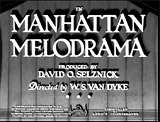

Manhattan Melodrama (1934), 93 minutes, D: W.S. Van Dyke II
Two New York City boyhood friends, Blackie Gallagher (Mickey Rooney as boy, Clark Gable as adult) and Jim Wade (Jimmy Butler as boy, William Powell as adult) were raised as orphans together, and grew up to choose opposite sides of the law - Gallagher became a slick gangster and racketeer, and Wade a noble and aggressive District Attorney. They both fell in love with the same charming woman Eleanor (Myrna Loy) who was caught between opposing forces. Their paths crossed later in a murder trial. Notable for the first film teaming Powell and Loy (who later would become famous with The Thin Man series) and for being the film that bank robber John Dillinger watched (for its similarity to his own life), prior to being killed outside Chicago's Biograph Theatre by the FBI in 1934.


The Merry Widow (1934), 99 minutes, D: Ernst Lubitsch
A lavish, unique, stylistic musical, a remake of the 1925 silent film. It was director Lubitsch's parody version of Franz Lehar's operetta, set during the time of the downfall of the Hapsburg Empire. Womanizing Prince Danilo (Maurice Chevalier) from the small Ruritanian country of Marshovia, was forced by King Achmed (George Barbier) to go to Paris to romance, marry, and bring back home one of the country's rich widows, Sonia (Jeanette MacDonald), to keep the wealth in the kingdom and prevent economic collapse. After a few plot twists and mistaken identities, all ended happily.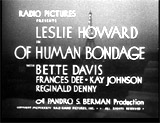

Of Human Bondage (1934), 83 minutes, D: John Cromwell
The first and best film version of Somerset Maugham's tragic, classic literary novel. The story of the emotional "human bondage" of a sensitive, but lame (club-footed) young Englishman medical student Philip Carey (Leslie Howard) who became compulsively infatuated and victimized by a blonde vulgar, trampy, selfish waitress/barmaid Mildred Rogers (Bette Davis). This marked the earliest critically-acclaimed role of Bette Davis, a turning point in her career, but Davis failed to win the Best Actress Academy Award in 1934.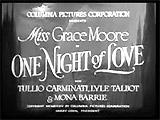

One Night of Love (1934), 84 minutes, D: Victor Schertzinger
An American girl on a trip to Italy, aspiring soprano opera singer Mary Barrett (Grace Moore, an actual opera star of the 1930s) hoped to achieve stardom in Europe. She fell in love with her demanding singing teacher Giulio Monteverdi (Tullio Carminati), and then almost gave up her career for Bill Houston (Lyle Talbot). But she triumphed at the New York Metropolitan Opera House. With a delightful musical score (which won Best Musical Score, the first time this Academy Award Oscar was given).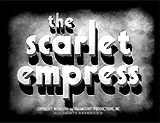

The Scarlet Empress (1934), 110 minutes, D: Josef von Sternberg
Josef von Sternberg's startling, dark, visually opulent, hauntingly expressionistic, and mostly fictional biopic of Prussian-born Princess Sophia Frederica (Marlene Dietrich as adult, Maria Riva as child). The young, naive, tremulous bride-to-be was brought on a seven-week journey to Moscow, Russia for an arranged marriage to Grand Duke Peter III (Sam Jaffe), nephew of domineering Empress Elizabeth (Louise Dresser), who renamed her Catherine. She hoped to improve the royal blood line, but Catherine was revulsed by her bumbling, idiotic, and childlike husband-to-be, and instead became romantically involved with opportunistic womanizer Count Alexei (John Lodge) and other military figures. Eventually, she engineered a coup d'etat with the aid of the military, had Peter III assassinated, and became Catherine the Great, Tsarina of Russia. This semi-erotic tale of 18th century Russia was one of the most daring films of the Hays Production Code era, featuring, among other things, immorality, nudity and open sexual decadence. The film also featured extravagant sets and von Sternberg's trademark stylization, as well as great performances. For a six-year period, Dietrich was Svengali von Sternberg's favorite leading lady - this was their sixth film together (and last great collaboration).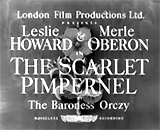


The Scarlet Pimpernel (1934, UK), 85 minutes, D: Harold Young
One of the greatest adventure swashbucklers ever made. Sir Percy Blakeney (Leslie Howard) posed as a mild-mannered English aristocrat, but in reality, this was a disguise for his activities as The Scarlet Pimpernel. He was a dashing, mysterious hero who rescued innocent but condemned French noblemen who faced the guillotine, during France's 18th century Reign of Terror. The Pimpernel's trademark was to leave behind a small red flower - a pimpernel. Blakeney lost the respect of his wife Lady Marguerite (Merle Oberon), who falls in love with the romantic, charming hero. However, in league with the devious Chauvelin (Raymond Massey), she set a trap for the Pimpernel in return for the lives of her arrested friends, and was astounded to learn that the Pimpernel was her own husband.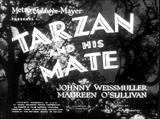



Tarzan and His Mate (1934), 93 minutes, D: Cedric Gibbons, Jack Conway
The second MGM/Weismuller Tarzan film, and probably the best of the series, the sequel to Tarzan the Ape Man. Jane (Maureen O'Sullivan) had left civilization and joined Tarzan (Johnny Weismuller) in the jungle treetops. Her ex-fiancee Harry Holt (Neil Hamilton) had returned to Africa with greedy ivory hunter/poacher Martin Arlington (Paul Cavanagh) to search for the hidden elephant burial grounds and to bring Jane back. Tarzan was tricked into leading them to the burial grounds. With great action sequences and a climactic rescue. A sexy adult version, with Jane swimming nude and wearing revealing animal-skin outfits.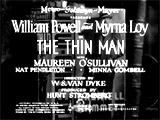



The Thin Man (1934), 93 minutes, D: W.S. Van Dyke
Based on the Dashiell Hammett detective story. The first (and considered the best) in the entertaining series of six films, the debut of the charismatic, beloved team of Powell/Loy as the suave, sophisticated, happy, and fun-loving detective couple. Retired police detective Nick (William Powell) and wealthy wife Nora Charles (Myrna Loy), with the help of their dog Asta, were asked to investigate the disappearance/murder of Dorothy Wynant's (Maureen O'Sullivan) missing father, screwball inventor Clyde Wynant (Edward Ellis). With witty dialogue, clever bantering between the two, wisecracks, sophisticated humor, romance, and an intriguing plot.


Viva Villa! (1934), 115 minutes, D: Jack Conway, Howard Hawks (uncredited)
The action-packed, loosely-historical account of Mexico's legendary bandit/hero. Pancho Villa (Wallace Beery) began as a bandit leader in the Mexican hills who stole from the rich and assisted the poor. He later battled with the Federales in the revolutionary struggle for the Mexican Republic. After his victory, he reverted to banditry, but then returned again in triumph to declare himself President of the country, after which he soon retired to his ranch. With additional characters including an aristocratic woman Teresa (Fay Wray) who fell in love with him, and an American journalist Johnny Sykes (Stuart Erwin) who helped to create the Villa legend. Probably with Wallace Beery's best screen performance ever.